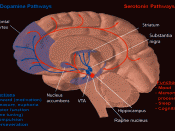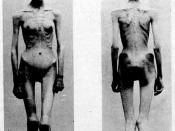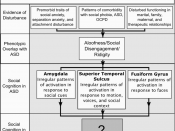We Should Talk More About Eating Disorders, Especially Anorexia.
Imagine walking down the street: cars, stores, and people around you. In one
moment you notice a nice-looking girl with a skinny body, long hair, and nice dress.
Why she is not smiling? Is she worrying abut something? The truth is that she is too busy
to smile; she is counting calories and asking herself: did I eat too much today? Should I
skip that apple? This is what teenagers ask themselves that have anorexia, an eating
disorder where the main characteristics are the restriction of food and the refusal to
maintain a minimal normal body weight. Most anorexics lose weight by restricting their
food intake. To improve the level of information about anorexia in our society, we
should talk more about eating disorders, especially anorexia.
People do not know a lot about anorexia, but it is a very serious problem.
Researchers say that in the "...eating disorders ranked as the nation's third worst health
problem for girls under 18" (Cohen 15). People are dying because their body used all
supplies of vitamins and cannot handle hunger any more, but they are still unhappy, and
they still think that they weigh too much. Anorexia causes physical and psychological
changes.
Eating disorders are more common in women: with three women affected for
every two men but it mostly attacks teenage-girls. They are growing up, there body is
changing but they view that as getting fat. "About five million people in the United
States, most of them teenage girls, have anorexia" (Corcos 12). An anorexic can feel
hunger; "People with anorexia typically starve themselves, even though they suffer
terribly from hunger pains" (Hoffman). Their fear is that if they eat a tiny bit or eat the
wrong thing, their hunger will overwhelm...



Anorexia
Firstly, the thing i like most about this essay is, you started off by asking us to picture something, which is a good writing technique. Secondly, your points are clear and to the point, and your bibliography is clear and can easily be understood. One thing you didnt do however is talk about the effects of Anorexia, like, hair loss, brital teeth, inbfertility so on so forth. But all in all it was brillant, well done!
2 out of 2 people found this comment useful.